Memoria – Review
by Edward
|
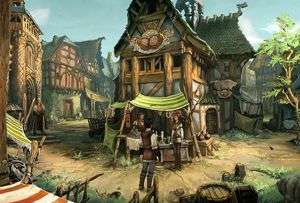 Over the last few years, it’s been genuinely fascinating to watch the slowly-developing history of Daedalic Entertainment. With only five years on the calendar, their evolution has been incredible, and watching how they’ve grown from titles like A New Beginning – ultimately flawed, but with plenty of promise – to the Deponia series – one of the greatest new series of recent years – is truly awe-inspiring. This year is their most ambitious yet, with the release of The Night of the Rabbit kick-starting a release schedule that involves bleak RPG, Blackguards, the finale to the stellar Deponia series, and 1954 Alcatraz, which proved to be one of my favourite titles at E3 this year.
Over the last few years, it’s been genuinely fascinating to watch the slowly-developing history of Daedalic Entertainment. With only five years on the calendar, their evolution has been incredible, and watching how they’ve grown from titles like A New Beginning – ultimately flawed, but with plenty of promise – to the Deponia series – one of the greatest new series of recent years – is truly awe-inspiring. This year is their most ambitious yet, with the release of The Night of the Rabbit kick-starting a release schedule that involves bleak RPG, Blackguards, the finale to the stellar Deponia series, and 1954 Alcatraz, which proved to be one of my favourite titles at E3 this year.
Another highlight in that schedule is Memoria, Kevin Mentz’s take on the Dark Eye franchise that continues on from last year’s Chains of Satinav. Players assume the role of Geron, who is on the search for a magic spell that allows the user to change the form of someone or something into whatever the caster desires. However, before he can get his hands on this powerful sorcery, he must help find the answer to a riddle that’s been left unsolved for nearly half a millennia. This mystery concerns the fate of Princess Sadja, who took off on a quest to find a sacred artefact, only to disappear and become lost to the annals of time. From here, Memoria seamlessly combines the stories of both Sadja and Geron, as players seek to discover the fate that befell the forgotten Princess to help our hero solve the riddle.
From this premise, Mentz and Memoria weave a wonderful narrative that will shock and reward the player in equal measure, with one of the most intelligent endings I’ve experienced in years. The balancing of both narratives in particular is one of the story’s finest traits, as it effortlessly moves between the low-key moments that punctuate Geron’s life post-adventuring and the larger-scale conflict that acts as a driving motivation for Sadja. The constant shifts between both characters always feels natural to boot, and even though both protagonists seem diametrically opposed in their goals – Sadja wants to be remembered forever, but Geron constantly downplays his heroic past – they work as a great pairing in their own right.
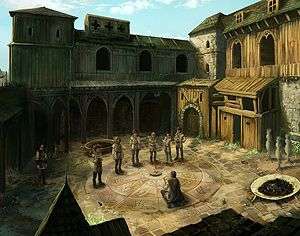 For the most part, characters are well-written, and each person brings something new to the world, even if it’s just to give an air of mundanity to Geron’s life. Where the writing excels the most is in the story itself, as it keeps players constantly guessing as to the answer of the riddle and what fate befell Sadja, and although I dare not spoil the conclusion, it’s safe to say that players will never see coming; I’m still unable to get over it, even as I write.
For the most part, characters are well-written, and each person brings something new to the world, even if it’s just to give an air of mundanity to Geron’s life. Where the writing excels the most is in the story itself, as it keeps players constantly guessing as to the answer of the riddle and what fate befell Sadja, and although I dare not spoil the conclusion, it’s safe to say that players will never see coming; I’m still unable to get over it, even as I write.
Unfortunately, while I loved the overall ending, I didn’t much care for the moral choice that players are forced into at the end. Even though it’s effective and doesn’t feel shoe-horned, it exposes the only issue that I had with Memoria’s writing – there’s not enough of it.
While the writing is in no way lacking, it feels like some of the characters could have used several more minutes of screen-time to provide further back-story or to gain a greater insight into their motivations, so that later events would have a greater impact behind them. In particular, the moral ending that occurs would have been even more difficult to make if the characters involved had just a little more interaction with each other, because while you’re accommodated for if you haven’t yet played Chains of Satinav, it feels like you don’t know everyone as well as you should in order to make an informed decision. If there were just a couple of extra scenes between certain characters then the writing would have felt a lot stronger, but it still stands up well regardless.
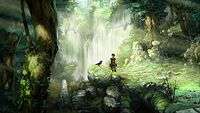 |
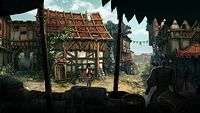 |
 |
 |
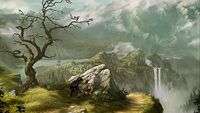 |
 |
A common complaint of Daedalic titles is that their English translations leave something to be desired, and while Memoria is far, far away from the low-points of A New Beginning – where one of the protagonists constantly sounded like she was auditioning for yoghurt commercials – there’s still room for improvement. While the staff Sadja carries with her is easily the highlight of the voice-acting, the princess herself is hit and miss, and very few characters leave without delivering a few dodgy lines. It never reaches the inconsistency of Night of the Rabbit earlier this year, but you may find yourself occasionally skim- reading the subtitles and clicking through the dialogue.
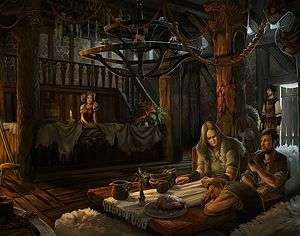 With that in mind, you’ll also want to pay as much attention to the transpiring events as possible, otherwise you’ll find yourself quite taxed by some of the puzzles that crop. Even as someone who’s been playing point-and-clicks for fifteen years, there were plenty of moments where I found myself stumped or needing to approach the situation from a different angle, and while some puzzles are tough, they’re never unfair. There’s a section requiring players to fumble through a maze that seemingly relies on guesswork rather than logic, but this puzzle serves as the exception, rather than the rule. Even then, the potential frustration is mitigated by the option of skipping to the end of the puzzle, with all the items you’d need added to your inventory automatically, at the expense of a potential achievement and ever knowing the actual solution.
With that in mind, you’ll also want to pay as much attention to the transpiring events as possible, otherwise you’ll find yourself quite taxed by some of the puzzles that crop. Even as someone who’s been playing point-and-clicks for fifteen years, there were plenty of moments where I found myself stumped or needing to approach the situation from a different angle, and while some puzzles are tough, they’re never unfair. There’s a section requiring players to fumble through a maze that seemingly relies on guesswork rather than logic, but this puzzle serves as the exception, rather than the rule. Even then, the potential frustration is mitigated by the option of skipping to the end of the puzzle, with all the items you’d need added to your inventory automatically, at the expense of a potential achievement and ever knowing the actual solution.
Aside from the maze, the rest of the puzzles are an eclectic mix, aided by the fact that Geron and Sadja’s skills of looking at everything in the environment and combining items in their inventory are bolstered by the addition of magic. Each character is given a unique set of spells, and this opens up a new avenue of puzzle-solving that few other titles can bring you. Where Memoria differs from The Night of The Rabbit, which also had magic featured prominently in its story, is that the latter makes more use of the spells, and by the end of the adventure you’ll have used all of the powers several times over in a myriad of different scenarios, where the former was content with abandoning the magic shortly after endowing you with it. Memoria is also aided by the fact that each chapter will use a different style of puzzle-solving, allowing the action to vary and keep the flow strong whilst forcing the player to use as many of their brain cells as possible to get to the end. Although some of the chapters are far shorter than the others, it actually works in their favour, as it means that each has their own pace and doesn’t outstay its welcome, and allows the often-ingenious puzzles – of which there are many – to truly shine.
If you do ever find yourself getting stumped for prolonged periods, it’s not all bad, as you can regain your composure while absorbing the beautiful backgrounds that never fail to look breathtaking. It’s a darker and more adult style than most Daedalic fare, but you’ll be hard-pressed not to start compulsively reaching for the screen-shot button every time you enter a new environment or start watching a cut-scene. Admittedly, the music isn’t as memorable, but it never finds itself becoming offensive or annoying, just slightly forgettable at times.
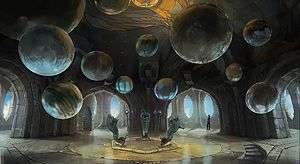 You’ll have seen everything that Memoria has to offer after nine hours, but there’s some replayability thanks to the often-missable achievements, which reward you for playing more skilfully, or for taking one path over another. Fortunately, the action is well-paced, and you’ll never feel like a chapter has outstayed its welcome. As mentioned earlier, it’s more a case that you’ll wish there was more to play through as, while the story isn’t too short, you’ll wish you could stay in the world and take in more of the lore, or learn more about the characters.
You’ll have seen everything that Memoria has to offer after nine hours, but there’s some replayability thanks to the often-missable achievements, which reward you for playing more skilfully, or for taking one path over another. Fortunately, the action is well-paced, and you’ll never feel like a chapter has outstayed its welcome. As mentioned earlier, it’s more a case that you’ll wish there was more to play through as, while the story isn’t too short, you’ll wish you could stay in the world and take in more of the lore, or learn more about the characters.
While it doesn’t negatively impact the overall experience, minus a moral choice at the end, more content could only have improved the story, and by the time the credits rolled I was genuinely sad to say goodbye to the world, as well as gob-smacked by the amazing ending. While I hadn’t previously involved myself in the Dark Eye universe, I found myself heavily engrossed by the end, and even if you haven’t played the previous entry in the series or a Daedalic title before, then there are few better ways to start than Memoria.
Pros- Stunning art style that makes every background a beautiful vista.
- A great story with an amazing ending.
- Ingenious puzzles that keep themselves varied and the player scratching their head.
- Could have done with slightly more characterisation to give the moral choice and relationships more impact.
- Inconsistent voice-acting, although admittedly never becoming too frustrating or irritating.
- Soundtrack is a little forgettable.
Combining a great dual-protagonist narrative with constantly-intelligent puzzles and a beautiful art style, Memoria provides players old and new to the genre with a great adventure that will constantly keep them guessing, and an ending that pays off in dividends. While the voice-acting isn't perfect and it feels like more time in the world wouldn't have gone amiss, Kevin Mentz and Daedalic have made an excellent point-and-click that easily ranks among their best, and Memoria is one that you won't soon forget. I'm not sorry for that pun.
Last five articles by Edward
- Best of 2015: Journey's End: A New Beginning
- Journey's End: A New Beginning
- You Can't Choose Your Happy Ending
- Okay, Let's Fix Comedy In Games - The V-Effekt
- Time Keeps On Smashing Away

















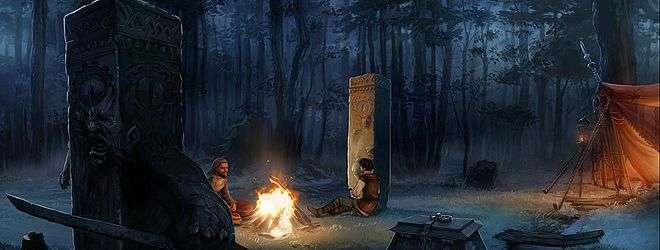
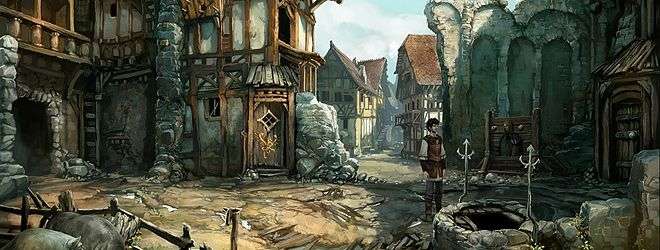






There are no comments, yet.
Why don’t you be the first? Come on, you know you want to!